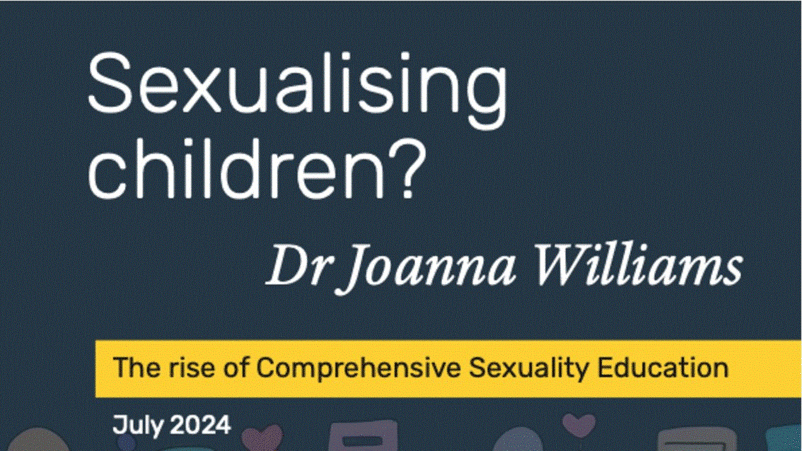
A major new paper criticises so-called “comprehensive sexuality education”, raising concerns about its content, effectiveness, impact on parental rights, and psychological effects on young people.
Comprehensive Sexuality Education (CSE) focuses on the broader concept of ‘sexuality’ rather than just ‘sex’. It is promoted by international institutions such as the UN, the World Health Organisation (WHO), and the European Parliament, and also by major international NGOs.
CSE has also inspired the most recent updates of Relationships and Sexuality Education here in Ireland. (See for instance the 2022 background paper for Senior Cycle SPHE)
The report from Dr Joanna Williams, a British academic and former director of the Centre for the Study of Higher Education at University of Kent presents a detailed critique of CSE, expressing numerous concerns about its implementation and impact.
Dr Williams argues that CSE promotes values and behaviours that may conflict with the cultural, religious, or moral beliefs of many families and communities, as it goes beyond providing basic knowledge about human sexuality and reproductive health, serving as a tool to advance a specific political agenda.
CSE is often expressed in the language of political activism. For instance, Planned Parenthood, the main abortion provider in the US, claims that CSE can “provide an important forum for building solidarity between young people with varying degrees of access to privilege and sexual rights. It can also strengthen active citizenship skills for working towards a sexual culture that is more just and equal.”
A primary concern highlighted by Dr Williams is the age-appropriateness of the material in CSE programs. She argues that children are exposed to complex sexual information at a very young age, potentially leading to confusion and inappropriate behaviour.
For example, in its paper “Standards for Sexuality education in Europe”, the WHO states: “In this document, it was deliberately decided to call for an approach in which sexuality education starts from birth. From birth, babies learn the value and pleasure of bodily contact, warmth and intimacy. Soon after that, they learn what is ‘clean’ and what is ‘dirty’. Later, they learn the difference between male and female, and between intimates and strangers. The point is that, from birth, parents in particular send messages to their children that relate to the human body and intimacy. In other words, they are engaging in sexuality education.”
This is clearly an extremely broad concept of ‘sexuality education’. Why use this term to describes activities that have nothing at all to do with sex?
Dr Williams stresses the importance of protecting children’s innocence and argues that parents should play the primary role in educating them about sex, according to their maturity and readiness.
Dr Williams also questions the effectiveness of CSE in achieving its stated goals, such as reducing teenage pregnancies and sexually transmitted infections. She presents data and studies suggesting that CSE may not be as successful as its proponents claim. This is backed up by ESRI data from Ireland. An ESRI report from 2020 said there is “little relationship between receiving Relationships and Sexuality Education (RSE) or not and young people’s sexual behaviour and competence”.
Concerns about the infringement of parental rights and family autonomy in children’s education are also discussed. Dr Williams argues that CSE programs often bypass parental consent and involvement, imposing a one-size-fits-all approach that does not consider the diverse values and beliefs of families.
Another critical point raised is the potential psychological impact of CSE on children and adolescents. The exposure to explicit sexual content and discussions about sexual diversity at a young age can lead to psychological distress, confusion about gender identity, and an increase in risky sexual behaviours, she argues. Dr Williams calls for more research and evidence to assess the long-term impacts of CSE on mental and emotional health.
She also criticises the philosophy behind this approach, maintaining that CSE is rooted in a particular worldview that emphasises sexual freedom and autonomy, and promotes a relativistic approach to morality, where all sexual behaviours are seen as equally valid.
Nessun commento:
Posta un commento